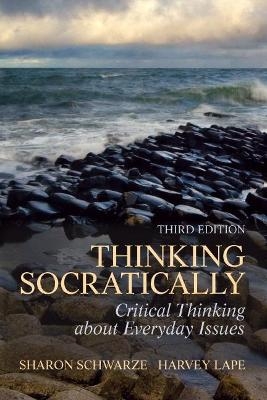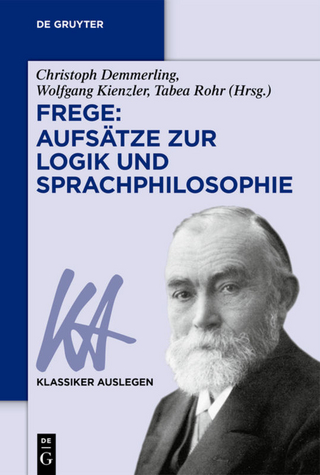
Thinking Socratically
Pearson (Verlag)
978-0-205-09801-9 (ISBN)
Packages
Access codes for Pearson's MyLab & Mastering products may not be included when purchasing or renting from companies other than Pearson; check with the seller before completing your purchase.
Used or rental books
If you rent or purchase a used book with an access code, the access code may have been redeemed previously and you may have to purchase a new access code.
Access codes
Access codes that are purchased from sellers other than Pearson carry a higher risk of being either the wrong ISBN or a previously redeemed code. Check with the seller prior to purchase.
-- Critical Thinking Skills in Everyday Context – The Socrates Model
Thinking Socratically is a treatment of critical thinking, rather than an informal logic textbook. It emphasizes a philosophical reflection on real issues from everyday life, in order to teach students the skills of critical thinking in a commonplace context that is easy to understand and certain to be remembered.
Teaching and Learning Experience
Improve Critical Thinking - Thinking Socratically contextualizes the presentation of critical thinking topics through easy-to-understand information, and shows, rather than just tells, students how to be critical thinkers by encouraging them to follow Socrates as a model.
Engage Students – Thinking Socratically exposes students to a variety of readings listed after expository material, Venn diagrams, chapter-end summaries, etc. – in order to outline important concepts and learning tools needed for useful reasoning.
Support Instructors - Teaching your course just got easier! You can create a Customized Text or use our Instructor’s Manual, or PowerPoint Presentation Slides. Plus, Thinking Socratically is organized around topics for ease of assignments, and uses standard terminology to eliminate student confusion.
Dear Colleagues, When we first started teaching critical thinking over twenty-five years ago the available textbooks fell into two camps: some were simplified "introduction to logic" texts, while others were little more than rhetoric handbooks fortified with a section on informal fallacies. The first group offered models for critical thinking but provided no material to think critically about. The second analyzed devious ways of persuasion used in everything from advertising to politics. We soon began constructing our own materials for critical thinking, using the stories, news events, and issues that our students encountered in their daily lives. We believed then, and we believe now, that students need to learn critical thinking skills in a variety of contexts and from actual instances, not from concocted textbook examples. Our approach to critical thinking also has a strong philosophical underpinning. This helps students understand how their own beliefs are formed and how they fit together into webs of belief and ultimately into a view of the world which is shaped by their experience and which shapes their experience. Having this philosophical understanding helps them to monitor their own critical thinking in a new way, and it helps them to understand why we sometimes have arguments with each other. All of this points to our definition of critical thinking which is open rational dialogue with our friends – and with ourselves. We include the usual topics found in critical thinking texts such as deductive and inductive reasoning and the fallacies, but we also present critical thinking as anchored in a much broader philosophical context. Thus we include excerpts from Plato, Descartes, and Kant, among others. Moreover, we show how critical thinking applies in such diverse disciplines as history and science. Finally, we conclude Thinking Socratically with a whole section on ethics because, like Socrates, we think critical thinking can help people be better people, not just better critical thinkers. We have found that students at every level enjoy and benefit from Thinking Socratically. It has been used around the country by students from the undergraduate to the graduate level. Even teachers in K-12 programs have used earlier editions to teach themselves how to teach critical thinking to their pre-college students. We hope that you will consider using this text if you are not using it already. Please do not hesitate to contact us at Cabrini College with your comments, questions, and suggestions. We began this text with the desire to make our students better critical thinkers and that is still our goal – to make students everywhere more able to use critical thinking skills in their everyday lives. Our email addresses are sschwarze@cabrini.eud and hlape3@hotmail.com. Sincerely, Sharon Schwarze and Harvey Lape Cabrini College
Found in this Section:
1. Brief Table of Contents
2. Full Table of Contents
1. BRIEF TABLE OF CONTENTS
Preface
Acknowledgments
Part I Connections
Chapter 1 Why be a Critical Thinker?
Chapter 2 Language
Chapter 3 Knowledge and Certainty
Chapter 4 Arguments and Explanations
Part II Deductive Reasoning
Chapter 5 Deductive Links
Chapter 6 Deductive Argument Forms
Part III Inductive Reasoning
Chapter 7 Supporting Our Claims
Chapter 8 Standards of Inductive Reasoning
Chapter 9 Fallacies
Chapter 10 Scientific Reasoning
Chapter 11 Pseudoscience
Part IV Reasoning About Values
Chapter 12 The Nature of Morality
Chapter 13 Reasoning about Good and Bad
Chapter 14 Moral Dialogue
Chapter 15 Reason and Commitment
Index
2. FULL TABLE OF CONTENTS
Preface
Acknowledgments
Part I Connections
Chapter 1: Why be a Critical Thinker?
Critical Thinking and the Importance of Open Dialogue
What Is Critical Thinking?
Euthyphro
Plato
Study Questions
Reason and Culture
Why the Geese Shrieked
Isaac Bashevis Singer
The Shaman and the Dying Scientist: A Brazilian Tale
Alan Riding
Study Questions
The Limits of Reason
Summary
Exercises
Chapter 2: Language
The Priority of Language
Language and the World
The Corner of the Eye
Lewis Thomas
Eight Little Piggies
Stephen Jay Gould
Study Questions
Words, Statements, and Beliefs
Warranted Statements
Making of Americans
Gertrude Stein
Study Questions
Factual Statements
Web of Belief
9/11 Rumors That Harden into Conventional Wisdom
Michael Slackman
Cookies
Douglas Adams
Study Questions
Summary
Exercises
Chapter 3: Knowledge and Certainty
Belief and Knowledge
Knowledge and Certainty
Meditations on First Philosophy in Which the Existence of God and the Distinction of the Soul from the Body Are Demonstrated
René Descartes
A Brief History of Time
Stephen Hawking
Study Questions
Consensus and the Web of Belief
Ideas & Trends; For Air Crash Detectives, Seeing Isn’t Believing
Matthew L. Wald
President Tom’s Cabin
Jill Lepore
Study Questions
Summary
Exercises
Chapter 4: Arguments and Explanations
Arguments: Premises and Conclusions
Implicit Premises and Conclusions
Arguments: Standard Form
Logical Warranting
Deductive Reasoning
Inductive Reasoning
Factual Warranting
The Decameron: Michele Scalza
Giovanni Boccaccio
The Decameron: Melchizedek
Giovanni Boccaccio
Study Questions
Explanations
The Day-Care Deaths: A Mystery
Linda Herskowitz
Study Questions
Summary
Exercises
Part II Deductive Reasoning
Chapter 5: Deductive Links
Reasoning with Necessity
Dissenting Opinion in Gregg v. Georgia
Thurgood Marshall
Study Questions
Analyzing a Deductive Argument
Validity and Logical Implication
Summary
Exercises
Chapter 6: Deductive Argument Forms
Logic
Some Common Valid Argument Forms
Anselm’s Ontological Argument
Norman Malcolm
Study Questions
Anselm’s Ontological Argument
Summary
Exercises
Part III Inductive Reasoning
Chapter 7: Supporting Our Claims
Evidence: Traces and Patterns
Report on Yale Murder Outlines Suspicions
James Barron And Alison Leigh Cowan
Trial By Fire: Did Texas Execute an Innocent Man?
David Grann
Study Questions
Confirmation and Proof: Webs of Belief
The William Bradfield Case: Murder on the Main Line
Mike Mallowe
Coded Bradfield Note: ‘My Danger Conspiracy’
Emilie Lounsberry
The Jury: Convinced or Confused?
Emilie Lounsberry and Henry Goldman
Bradfield, on Stand, Denies Any Role
Emilie Lounsberry
Bradfield and Women
Henry Goldman
Study Questions
Summary Exercises
Chapter 8: Standards of Inductive Reasoning
Three Basic Forms
Generalizations
The Literary Digest Predicts Victory by Landon, 1936
“Digest” Poll Machinery Speeding Up
Landon 1,293,669; Roosevelt, 972,897
What Went Wrong with the Polls?
Study Questions
Analogies
Troublemakers: What Pitt Bulls Can Teach Us about Profiling
Malcolm Gladwell
Study Questions
Causal Claims
So, Smoking Causes Cancer: This Is News?
Denise Grady
Renewing Philosophy
Hilary Putnam
Study Questions
Summary
Exercises
Chapter 9: Fallacies
The Nature of Fallacies
Fallacies of Irrelevance
Lost Genius
Russell Baker
Study Questions
Fallacies of Faulty Generalization
Fallacies of Emotional Manipulation
Bachmann Finds an Issue With HPV Debate
Trip Gabriel
Study Questions
Summary
Exercises
Chapter 10: Scientific Reasoning
Science and Good Reasoning
Copernicus and Kepler
The Sex Life of the Whiptail Lizard
Harry Collins and Trevor Pinch
Study Questions
Hypothetical-Deductive Reasoning
Summary
Exercises
Chapter 11: Pseudoscience
Distinguishing Science from Pseudoscience
Fliess, Freud, and Biorhythm
Martin Gardner
Study Questions
Summary
Exercises
Part IV Reasoning About Values
Chapter 12: The Nature of Morality
Supporting Moral Claims
Chapter I: Of the Principle of Utility
Jeremy Bentham
Study Questions
Objectivism and Subjectivism
The Brothers Karamazov
Fyodor Dostoevsky
Study Questions
Morality and Reasoning
Summary
Exercises
Chapter 13: Reasoning about Good and Bad
Making Moral Decisions
Reasonable Objectivism and Reasonable Subjectivism
Grounding for the Metaphysics of Morals
Immanuel Kant
Existentialism is a Humanism
Jean-Paul Sartre
Study Questions
Kant
Sartre
Summary
Exercises
Chapter 14: Moral Dialogue
Dogmatism and Relativism
Euthyphro as Dogmatist
Plato
Classroom Scene
Study Questions
Moderation as Key
Summary
Exercises
Chapter 15: Reason and Commitment
Open Rational Dialogue
Keynote Speech May 18 at Simpson College’s 1996 Commencement
Jane Smiley
Study Questions
Index
| Erscheint lt. Verlag | 28.2.2012 |
|---|---|
| Sprache | englisch |
| Maße | 155 x 230 mm |
| Gewicht | 439 g |
| Themenwelt | Geisteswissenschaften ► Philosophie ► Logik |
| Geisteswissenschaften ► Sprach- / Literaturwissenschaft ► Anglistik / Amerikanistik | |
| Sozialwissenschaften ► Pädagogik ► Allgemeines / Lexika | |
| ISBN-10 | 0-205-09801-0 / 0205098010 |
| ISBN-13 | 978-0-205-09801-9 / 9780205098019 |
| Zustand | Neuware |
| Haben Sie eine Frage zum Produkt? |
aus dem Bereich


